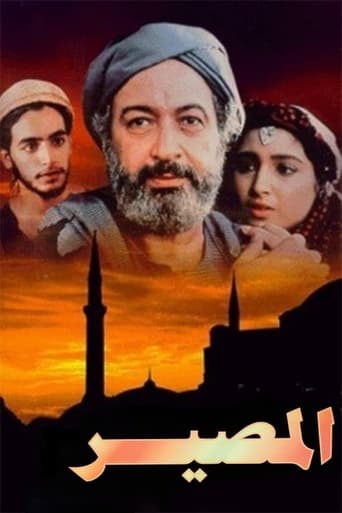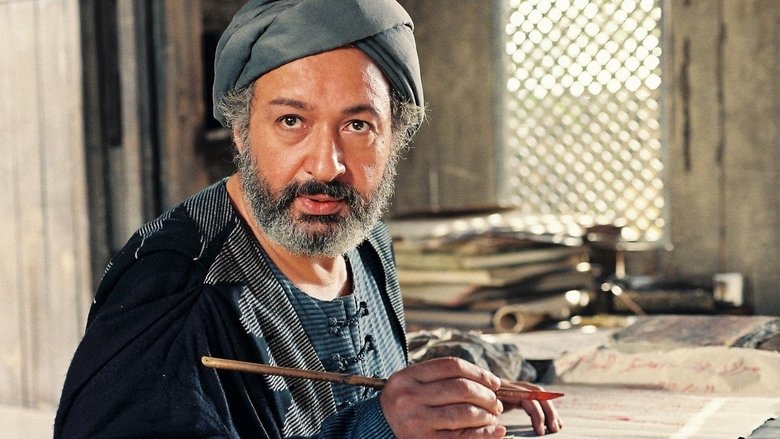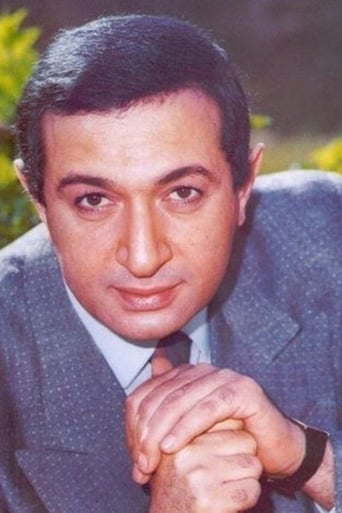

The Destiny (1997)
In the 12th century's Andalusia lives Ibn Rushd a prominent Islamic philosopher with his wife Zeinab and daughter Salma. The principality is ruled by Khalifa ElMansour who has two sons, ElNasser, an intellectual that likes Ibn Rush and is in love with his daughter Salma. The younger son Abdallah is more into dancing and poetry, spending most of his times with the gypsy family and getting the daughter pregnant. The Khalifa is depending on the extremists to build his army granting them more power which they use to combat artists and philosophers. The extremists succeed in recruiting Abd Allah and train him to kill his father. Events go on where Marawan, the gypsy singer, is killed and Ibn Rushd's books are burnt. Adapted from the real life of Ibn Rushd AlMasir is Chahine's statement against extremism.
Watch Trailer
Cast
Reviews
Although it has its amusing moments, in eneral the plot does not convince.
This is one of the best movies I’ve seen in a very long time. You have to go and see this on the big screen.
One of the worst ways to make a cult movie is to set out to make a cult movie.
An old-fashioned movie made with new-fashioned finesse.
Egyptian director Youssef Chahine biopic of Arab philosopher Averroes (who lived in Andalusia during the 1100s) is surprisingly compelling, with fine production values, including a lavish color cinematography (this was a co production with France that won awards at the Cannes film festival in 1997). Averroes (played by Nour el Sheriff) is seen in the movie, avant la lettre, as a wise champion of rationality and against fundamentalism. Aside having to fight the intrigue of fundamentalists, he has to do some optical experiments and also has to deal with family problems, a misguided caliph, and Christian troops eager to attack Andalusia. The movie also includes ridiculous but charming musical interludes reminiscent of Indian movies.
Mr. Chahine is masterful and downright crafty in pushing forward his message for cosmopolitan rationality vs. parochial fanaticism: Starting from a telegraphed overview of historical events, ideological currents and characters from the two-century period (XI-XII) in Andalusia that saw a wave of North-African fundamentalist mercenary Berbers wrestle power away from the weakened remnants of the enlightened Umayyad dynasty, he made a deceivingly simple parable using old-time Hollywood formats and entertainment values à la `Thief of Baghdad.' Chahine is thus successfully addressing matters of dense philosophical and political import under the guise of an almost infantile entertainment. The plot, furthermore, echoes `Fahrenheit 451' and its overall ideological stance is reminiscent of A Man for All Seasons.' On the other hand, seeing its `musical' values as a bow to Hollywood is merely scratching at the surface, since it must be kept in mind that poetry in song the obsessive discipline of enlightened Islam was the most efficient vehicle for the birth and expansion of all values appropriated by Christian Western (read, European) civilization. Hence, the formal solution signifies much more than the surface. On the other hand, Chahine ties the past quite neatly -- through his storytelling and filmmaking craft -- with current world events and thought convolutions. For example, the stabbing of the bard character in Destiny couldn't be less than a painful fictionalization of the fundamentalist attack on the contemporary Egyptian novelist Mafouz. El Massir is an important piece of work, and I think everyone who is at all concerned or curious about the nature of the global forces at work today should take a long and detained look at it. This film carries a hefty punch and what's best -- you can barely feel it, as the masterful handling of the narrative, in terms of nothing but an entertaining parable, lets the dense message flow without any pretensions of `avant-garde' stylist truculence. M
I saw the film a couple of years ago. I thought it was a very good film. It dealt with terrorism, its origination and its effects on the youth and society of 12th century Arabia, which forms a present and alive problem in modern Arabia. The film had a great deal of technique and style. Although the film is set in the past, the language of the script is in colloquial Arabic, which is spoken on the streets of Egypt at this point in time. Making delivering the content of the words more important than giving the audience a believable setting. Aside from being a historical representation it was a philosophical thought on religion, society and politics. Some of the obvious themes in the film were as follows. The freedom of thought expressed in the power of the written and spoken word as a form of representation of the people, what they stand for, and their sufferings. In addition to the self and social destruction caused by ones political motivation hidden behind a religious façade. Finally the film brings great memory of Francois Truffaut's `Fahrenheit 451'-. In making the point that one can burn all the books in the world, but that would never take what is in the books away from the people, because true words, weather written or memorized, are humanities memory and being till the end of time. Both films complement each other, one can darlingly view, `Al-Massir' as the beginning of a time that was elaborately explored in `Fahrenheit 451.' Both films had the same ending, in which the books were burnt and the words were kept in the memory of the people, independent of what the present political power did. The words of scholars, philosophers and story tellers live forever.
Americans and Europeans should treat themselves to the courageous joy of this infectious film, if you can find it. If you're looking for Latcho Drom with a great story, this is it!Destiny is singularly beautiful in that it celebrates humanist passions and ideas as they were once allowed to be expressed in the Islamic culture of 12th century Spain. The Egyptian director Youssef Chahine ventures this anti-fundamentalist statement in a contemporary cultural climate where fundamentalism is on the rise. It exposes the street fascism and subtle eroticism that seduces young men into such sects.Destiny is exuberant. It has humor, music, dancing, free thinking dialogue, intriguing sets and architecture and, most of all, the ensemble portrayal of a joyful philosophic community whose members you can really grow to love. All the earthly things fundamentalists detest!Chahine deserves a larger world audience, by virtue of his bravery and outspoken-ness. He argues at risk of his own life in this film. If Akira Kurosawa could be embraced so wholeheartedly by the international community, so should Chahine. This film is a landmark. I hope financing from our part of the world will find its way to him. He has guts and passion.The film itself is like nothing else you will see made on these shores. It is emotionally unabashed. Our western ideals of coolness and hipness restrict many of our directors and actors. Passion is too often reserved for climactic moments, and commonly those moments are angry intimidation or vengeance scenes sparked by the Pacino clones of the world. Much of the actor's job is running and posing. In Destiny, the actors are not posing - they are joyfully uninhibited and alive!Recommended highly!! Vigorous entertainment. Brave ideas. Exotic sets. Bold, hand-hewn directorial craftsmanship. Great true story. And your only chance to see 12th century Andalusian culture come alive!


